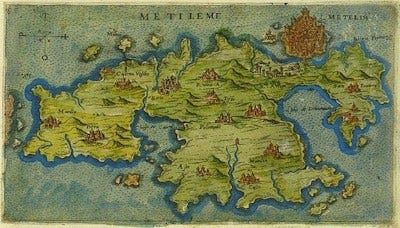Dear Classical Wisdom Reader,
It’s the moment single, diabetic, atopic folks fear. A single day when romance collides with confectionaries and allergens in a cultural milieu of Hallmark cards and ancient saints.
It’s no other than Valentine's day; an occasion to celebrate one of humanity’s timeless emotions: Love. Of course for those of you steeped in the Greeks, know the ancients had many words to describe the critically different types of love. This, upon even a second of reflection, makes a lot of sense. After all, the affection one feels for their partner differs (essentially!) from that which they feel for their child, their sibling, their friend…or the world in general.
In fact, there were over 30 terms to capture that essential and nuanced feeling. Here is a quick recap of some of our favorites:
Eros is what we would most easily recognize as February 14th style love, a romantic, intimate sort of relationship.
Philia was what we would refer to as a platonic love shared between friends, comrades and even the community at large.
Pragma was a love not of the loins, nor the heart, but of the head. It was the foundation block that we can recognise in the most successful of long-term relationships.
Agape represented a selfless and universal love that could be felt for strangers or wider society.
And Ludus was a playful, free-spirited frivolousness; an almost child-like joy of easy-going and uninhibited fun – the easy bonhomie of when you’re had exactly the perfect amount to drink!
While some ‘moderns’ might bemoan Valentines, thinking it is narrowly restricted to confines of just eros, lovers of the classics can appreciate love in all its forms.
So whether you celebrating Philia, Pragma, Agape or otherwise, have a wonderful day dedicated to LOVE.
And to get you excited about it all, I have a charming love story set on the romantic island of Lesbos, which was the very first ancient Greek novel. It’s a beautiful, heartwarming tale, certainly befitting for the holiday to come… but it's true topic may surprise you.
Classical Wisdom Members, please enjoy the full article on the first Star-crossed lovers as well as the original text below. It is part of our Classical Wisdom Ebook, The Ancient Novel, which includes the charming story of Daphnis and Chloe as well as the drippingly satirical Satyricon and the Comical Golden Ass (which in fact includes the incredibly romantic story of Psyche and Cupid...)
So whether it’s inspiration, consolation, or celebration, no matter what type of Valentines you have planned, we’ve got you covered.
Read below to learn how Daphnis and Chloe were so influential and ever lasting.
All the best,
Anya Leonard
Founder and Director
Classical Wisdom
Celebrate YOUR Love of the Classics, a life dedicated to the mind and mindfulness by joining our Classical Wisdom Society. Enjoy the community as well as our resources, including today’s E-book, The Ancient Novel, below.
Daphnis and Chloe: The Original Star Crossed Lovers
By Ben Potter
“What her passion was she knew not, for she was but a young girl and bred up among cIowtis, and as for love, had never so much as heard the name of it. But her heart was vexed within her, her eyes, whether she would or no, wandered hither and thither, and her speaking was ever Daphnis this and Daphnis that.” ― Longus, Daphnis and Chloe
Today we will tackle a love story from the languid prose of Longus. It’s the original bucolic tale of star-crossed lovers, Daphnis and Chloe.
But first, let us begin with its author.
Very little is known about Longus, this ‘Greek’ author with a Latin name. While he could easily have been a migrant to the island of Lesbos, it is more commonly accepted that he was a freed slave of a Roman family. This means, however, that he could have originated from anywhere and just happened to have an usually firm grasp of the Greek language.
Regardless, his knowledge and description of the beautiful island of Lesbos (most famous for Sappho and her perceived attitude to sexuality) is such that he must have spent a considerable amount of time there.
Slightly mysteriously, Longus has become something of a forgotten man of the ancient world and far from the household name he should be. Perhaps this is because of his ‘mongrel’ or slavish status or because Roman eyes in the 2nd century AD looked West and not East. Alternatively, it could have been that that particular hundred years was one of relative literary lull (considering what had preceded it)... or maybe it was just one of those things!
That said, he has not been without influence. His work is well remembered in both art and music by no lesser men than François Boucher and Maurice Ravel respectively. Also, Daphnis and Chloe may have been the inspiration for that swashbuckling Rob Reiner masterpiece, The Princess Bride.
But Longus was important for much more than that...
Keep reading with a 7-day free trial
Subscribe to Classical Wisdom to keep reading this post and get 7 days of free access to the full post archives.






